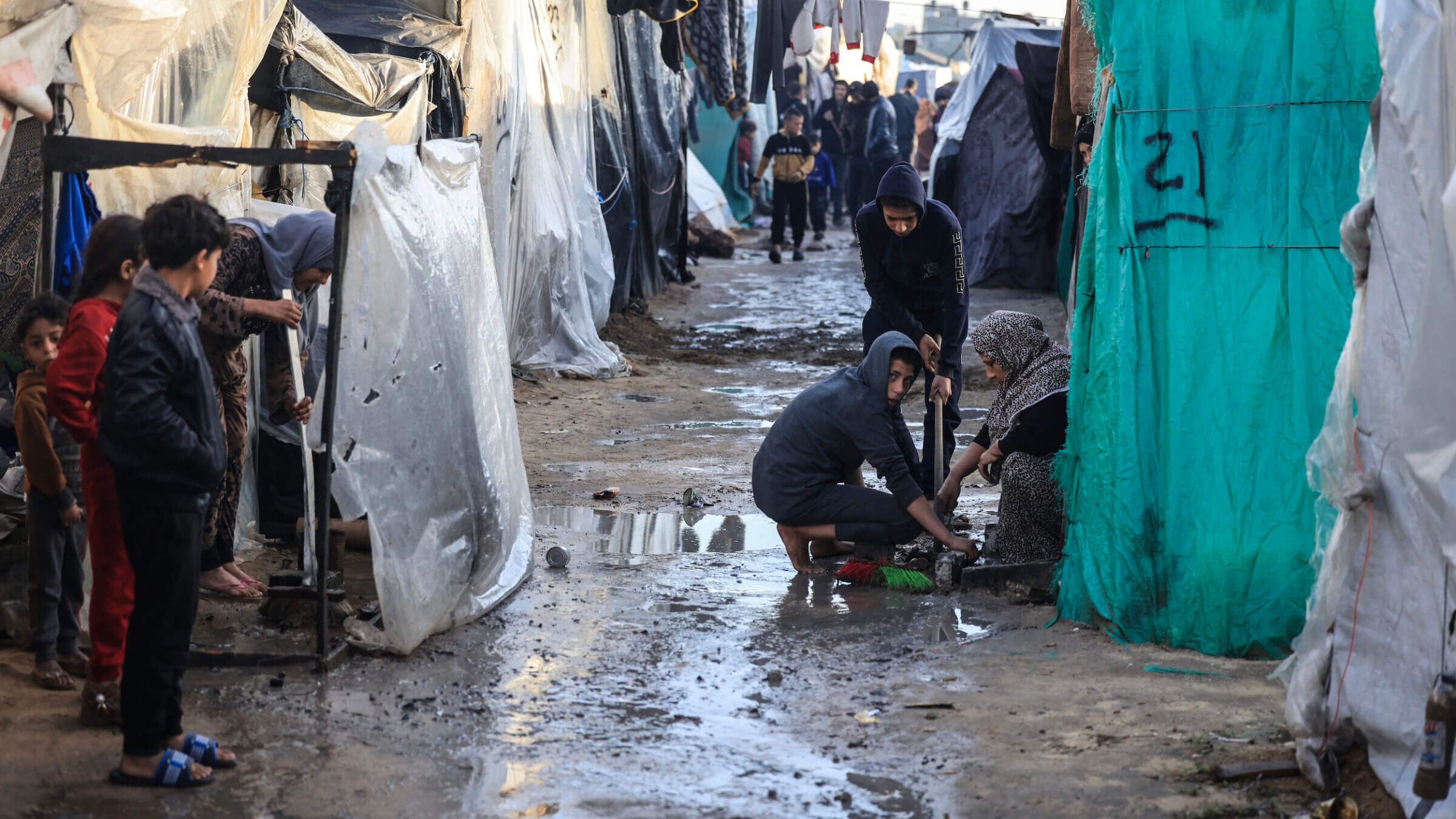With Gazans starving and freezing, the US withholding funds from UNRWA is unconscionable
I used to work for the beleaguered agency on the ground. Its work is essential to keeping Gazan civilians alive

Displaced Palestinians in Gaza gather amid tents flooded by heavy rain, at a makeshift camp set up by people who fled the ongoing battles between Israel and Hamas. Photo by AFP/Getty Images
As far as I know, none of my friends in Gaza has a home any longer.
Their losses are staggering, far too many to list when I say the Mourners’ Kaddish. They are sick from sleeping in flimsy tents through Gaza’s bitter winter storms, and they are more than hungry. Gazans are starving.
Under these conditions, the choice of the United States, United Kingdom and 13 other countries to withhold funds pledged to UNRWA — the United Nations Relief and Works Agency for Palestine Refugees in the Near East — for lifesaving humanitarian aid is unconscionable.
Twelve of UNRWA’s Gaza staff have been accused of participating in the Oct. 7 attack, out of some 13,000 employees. The accusation has outraged Israelis and it is a betrayal of UNRWA itself. I also take it as a betrayal, because I worked for UNRWA a decade ago, and I know that the agency is essential to people’s survival.
But the actions of a dozen people frankly pale against the foreseeable disaster that will be triggered by defunding assistance to the 2 million starving Gazan civilians who rely on UNRWA.
What do I mean by “rely”? During the 2014 war, I was part of UNRWA’s emergency response team, helping to shelter a total of 293,000 Gazans in 90 schools. Imagine 100 people crowding into each classroom of your child’s school.
As that number mounted, I became obsessed with procuring enough sleeping mats. I wanted each displaced person to have one narrow sliver of private space on the floor. We fell far short of that goal, but people can sleep without mats. The real crisis was our inability to protect the civilians in those classrooms, despite international laws designed to ensure that such shelters are safe.
Each day, I reported the precise location of each shelter-school to the legal office of the Israel Defense Forces, to confirm the protected status of each building. But that wasn’t enough: 44 Gaza residents were killed in seven strikes that hit those very buildings.
At least we were usually able to provide the people in our shelters a meal each day. No one starved.
UNRWA has always been indispensable in Gaza, especially in emergencies: No other agency rivals its physical, logistical and human presence; its knowledge of the border crossings; its purpose-built distribution vehicle fleet. A desperate community is reliant upon that to survive.
The current war’s horrors dwarf those of 2014 and defeat imagination. UNRWA is trying to assist 2 million people, under fire and in infinitely worse conditions. The agency says 152 of its staff members have been killed. Its Commissioner General reports that the agency is providing shelter for 1 million people, providing food and primary healthcare even “as the clock is ticking towards a looming famine.”
That was the state of need before UNRWA’s pledged funds were withheld. How much worse can it get?
Accusations have been made about 12 people — 0.1% of UNRWA’s staff. And now Eylon Levy, an Israeli government spokesperson, alleges darkly that more UNRWA staff have some connection with Hamas, whose military wing the United States and others define as a terrorism organization.
Hamas is also the de facto government of Gaza. As such, it employs thousands of civil servants including teachers, bureaucrats and rubbish collectors. Thus there are tens or hundreds of thousands of Gazans who can be accused of having “links” to Hamas.
Shall we call the children of those rubbish collectors “Hamas”? This amorphous statement carries no weight without specifics. How many of your acquaintances have a civil servant in their extended family?
UNRWA promptly took action against the 12 employees accused of involvement on Oct. 7. They were dismissed and notified of the possibility of criminal charges. The highest investigative body of the United Nations is examining the evidence.
I am repulsed by the brutality of some of those who breached the wall on Oct. 7. And I am enraged at the mythmakers who taught us that a normal Jewish life could be lived hard up against a wall that hid so much deprivation.
One essential value of human rights is their ability to protect all peoples. To put that Jewishly, my Israeli civilian relatives have as much right to safety as my Gazan civilian friends. The wrongness, the horror of attacking civilians in their homes, is the same on either side of the wall.
In the same breath and for the same rights of all human beings, I am aghast that the U.S., the U.K. and others could be so precipitous in joining in the assault on Gaza by holding back essential aid. They have responded to the charges against 12 people by suspending assistance to more than a million.
Palestinian refugees who rely on UNRWA’s services in the occupied West Bank, Lebanon, Syria and Jordan will also be immediately affected. UNRWA is funded entirely by such voluntary contributions. It operates on promises.
The withdrawal of aid is more than simply disproportionate. South Africa has already accused Israel of genocide at the International Court of Justice. Now, the nations that stripped UNRWA of funding share culpability for the actual famine that could soon grip Gaza. Observing a potential genocide is reprehensible enough; enabling it is a crime.
This drastic, hostile action has a political context.
UNRWA was created to serve Palestinians as one people dispersed to many places. It is a diplomatic reminder that Palestinians are one nation; the donor states that support it affirm Palestinians’ unified, unresolved national claims.
UNRWA’s critics claim that the agency extends the conflict by perpetuating Palestinians’ national consciousness. But UNRWA does not perpetuate the conflict; the conflict perpetuates UNRWA.
During my time with the agency, it maintained a tough internal neutrality policy for staff. Some felt that policy infringed on their freedom of speech. But UNRWA’s stance was clear: Engage in politics or work at UNRWA – not both.
As with any large employer, UNRWA’s systems can and do fail. The current, concerted undermining of UNRWA is not an appropriately scaled response to that failure.
Three times in my life, I have worked with people who have been so devalued that anything could be done to them: Cambodian survivors of the Khmer Rouge genocide, Afghan women who were not permitted to leave their homes, and Gazan Palestinians behind a wall.
There was a time when I did not place Gazans in that category, because they had preserved so much of what they would need to build a future beyond the blockade. They had exceptional levels of education and literacy, mutual assistance and social cohesion — even a vibrant life of the arts.
But everything I knew in Gaza is dust now. Palestinians have been so radically dehumanized that anything can be done to them in broad daylight, right in front of us.
This time it is not we Jews who are starving. Rather than remembering that we were strangers in Egypt or that we have been hungry more recently, I hear otherwise-ethical Jews becoming able to regard the suffering of others as a policy matter for debate.
How can the withholding of food be a question when we know that they are starving? And if this is now the ethical state of our world, how can any Jew respond except by choosing to aid and preserve life?

















